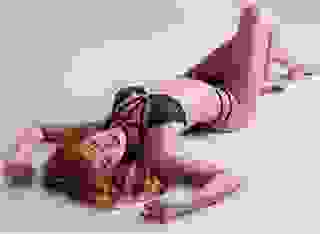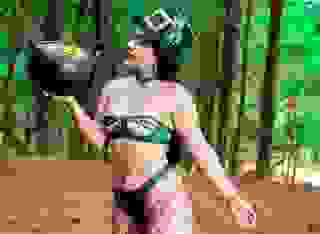- Loving Wives
- Voices from Another Room
Note: You can change font size, font face, and turn on dark mode by clicking the "A" icon tab in the Story Info Box.
You can temporarily switch back to a Classic Literotica® experience during our ongoing public Beta testing. Please consider leaving feedback on issues you experience or suggest improvements.
Click here©2009Adrian Leverkuhn
Are voices the man hears coming from behind closed doors, or from a past beyond redemption?
The man sat behind his desk in an office that looked out over the city from the 82nd floor of a large midtown skyscraper. He felt empty inside, dark and empty, just as he'd felt every day for weeks. Late afternoon cumulus clouds towered over the city, threatening rain - or worse - and even from the vantage of his office the city seemed to huddle below and brace for the coming storm. Yet the gathering clouds stood in curious contrast to the emptiness he felt in his heart. The sky outside held promises of release and renewal; inside he felt only the gray of winter bearing down. Verdant parks far below, swathed in vast oceans of green, mocked the chill that held him. He felt like trees in winter -- limbs stripped bare by indifferent winds, all waiting for sleep. He had never in his life been resolved to standing naked in the cold grip of long nights - alone.
There was a pencil on his desk, a metal lance on a plane of glass and steel, a mechanical pencil made in Germany that sat atop a neat stack of graphs and spreadsheets. The papers hadn't been touched in hours, some perhaps not in days. Unlike the man, the lead inside the pencil was sharp and ready. Plants waiting to be closed; jobs shipped from Ohio and Indiana to Singapore and Vietnam. What did it matter now?
A lithe woman, the man's secretary, walked into his office. She was in her mid-30s, very trim - but there was also something very precise in her manner. Precise, but her concern for the man was evident from the way she looked at him out of the corner of her eye, from the way she shook her head at his non-response to her entry. In her experience, men rarely ignored her. Certainly he hadn't -- not so long ago.
The woman told the man that the financials from Hanoi he had been waiting for were in, the P&Ls from Dayton would be ready before she left for the evening. She asked the man if there was anything he needed, 'Anything at all...' The man continued to look out the window; he watched clouds mass on the southwest horizon. He heard words, guessed their import, and he just managed to tell the woman, "No, not a thing." She left the room quietly, pulled the door to as gently as she could, then shook her head in - what? Sorrow? Regret?
'How could I have known?' she said as she walked away. 'Why didn't he talk about it?'
+++++
Raindrops blew sideways on the glass; drops streaked across the smoothness in glittering, down-swept arcs. The man watched the arcs, followed their motion as they fell to the inevitable conclusion of their journey. He fingered the bridge of his nose, ignored the single tear that formed in his right eye, ignored the glittering downward arc of his grief.
His eye moved to a flash in the sky; he watched as lightning ignited looming grayness, shattered arcs jumped from cloud to cloud. Release might yet come for him, he thought, if there was yet some small measure of justice left in the world. But no...
...But now the man understood -- he knew beyond any doubt - that justice was a fiction, a commodity bought and sold with the currency of grief and sorrow. He was living proof of that; proof that justice was as blind to human misery as the clouds that glowed in somnambulant passage. Justice is a commodity too often forbidden the broken hearted. And to those who break hearts there is at best a shallow redemption -- in the shadows.
He opened the top left drawer of his desk, and took out the small piece of paper he kept there. It was elegant paper, handmade and thick, its edges irregular and faded toward grays and beige. He looked at the words on the paper, felt himself drawn inward as he fell into their hidden traps once again. He had no experience with the unknown emotion the words held -- emotions sharp and cold like a blade held to his throat. And yet these words felt as if they had been meant for another -- like they had been borne far away, were of a time that no longer existed:
Just in silence, a tree -
naked rain kisses the up-turned needles of her limbs
and as in the gathering of a sigh
like a breeze, death comes, and life renews the question -
she vanishes within the emptiness
of love borne on careless wings
and is gone... into the silence that remains.
The man fingered the paper as her words broke over his soul, painted their shared barren landscape once again over the cracked canvas of what remained. He found no comfort in her words -- he saw an infinite sorrow as he held the paper in his hands, a sorrow not his own but his alone. He was unaware that he held the paper as he'd held her so often -- tentatively, loosely, with no sense of being beyond the oneness of his life. The man looked for hidden logic in her words, some way out of the trap, but every time he tried he had to turn away -- as if in his own inadequacy he had nothing to give.
"And life renews the question..." Henry Brinson said once again, lost in vast echoes of time.
+++++
He walked into that space he presumed to call home, into that other glass-lined cubist aerie high above the city that provided yet another interesting perspective on life far below. He took off his coat and laid it over the back of an Eames chair as he walked to the kitchen; his dinner was prepared and waiting in the bank of Sub-Zero refrigerators that lined one wall. He took the salad within and put it on the island in the middle of the kitchen, then fixed himself a scotch. He picked at the salad for a while but knew he was unable to feel even hunger now; he held the glass in his hand up to the light, contemplated the solitude that waited inside the smoky amber liquid, yet he found that silence wanting too. He held the glass under his nose and waited for memory to awaken, but that retreat had been cut off as well.
He put the glass down, walked through the space they had designed to the books they had collected; he looked at the wall of before him as one looks upon any wall. He reached for a book but his hand hesitated -- as if the truths within were too painful, too damning -- and his hand settled upon another. Meditations, by Marcus Aurelius. He picked a page at random, opened the book and stared at the words that leapt to his soul:
'Whatever happens to you has been waiting to happen since the beginning of time. The twining strands of fate wove both of them together: your own existence and the things that happened to you.'
The man nodded, closed the book. "Yes," he said quietly, almost dreamily. "Twining strands of fate."
He walked into his bedroom, their bedroom, and took off his clothes, got into the shower.
"And life renews the question..." Her words kept coming to him; he could not stop their haunted refrain.
No matter how hard he scrubbed the stains her words left would not go away.
He toweled himself dry, walked to his bed, their bed, and he lay his head down in hope of sleep.
And then the voices came, as they had for so many weeks.
+++++
Seven months earlier
She'd only been working with him for a few weeks but the signs were unmistakable. She was interested. More than interested. She had interviewed with him three weeks ago, come dressed conservatively but with just a little flash showing; now it was all flash, all provocation. She was an attractive woman, single and attractive. Probably a little ambitious, too. 'Be careful,' he'd told himself a couple of times already. He could already see her more overt manipulations; he'd have to keep an eye out for her less obvious maneuvers.
But she had been careful, too.
She'd watched him watching other women, watched where his eyes went and where they lingered. He liked taller women, blonds, of course, and his eyes followed legs, were drawn to the clicking of high heels on terrazzo. He easily made eye contact with most people but when these same attractive women came to see him, to talk to him; he had a hard time making eye contact, didn't he? He suddenly seemed distracted, easily flustered by these women, and she'd watched as more than one had managed him by employing a well-timed crossing of the legs or a subtly revealed cleavage. She'd almost laughed out loud!
Men were so funny, she told herself; so predictably funny. So like little boys in a candy store. All you had to do was offer just the tiniest chance of a taste and you owned them. Some men, anyway. Stupid to make generalities unless you had all the facts because, she knew from experience, some men were very hard to handle. Very hard to control. She had the wounds to prove it, too.
But for Carolyn Saunders there were few men she could not control. Her new 'boss' was almost too laughably predictable, so boyishly drawn to the impulses and desires instinct had planted in his mind. And while this need she had to control might soon be fulfilled, she held only discontent near her heart. While this new man might only be another skirmish in a greater war, she considered herself a master tactician. And she had scores to settle.
She settled-in and waited, waited for the weakness people of her sort so often seek. She was patient, and like any good predator she knew the ways of her prey. And she was hungry, always so very hungry.
+++++
Jennifer Brinson sat on the examining room table, cold vinyl sticking to the back of her thighs, the fire in her left breast still pulsing. Whoever invented the mammogram, she thought, must have been an inquisitionist. She sat with ankles crossed, arms folded protectively across her chest, but she couldn't shake the cold dread she'd felt all morning. Even the stupid magazines that always seem to find their way to physician's offices were of no use.
'So stupid!' she scolded. She'd stopped doing self-exams years ago, thought she was too old for such nonsense, but the hot lump in the belly of her left breast she'd felt in the shower that morning hadn't cared one way or another, it didn't give a damn how old she was. Or how smart or stupid or careless. It just was. It existed, and that hot, hard existence had in an instant become the central reality of her life. There was no doubt at all in her mind that -- 'things had changed.'
The doctor came in, Deborah M. Goldstein, M.D. embroidered on her white coat. A smug young girl probably full of herself, Brinson thought; a freshly minted internist and probably clueless! As she walked into the examination room all Brinson could think was that her regular doctor had picked a fine time to go on vacation! And he'd left her in the clutches of this chubby bohemian princess, this hairy-legged poster-child for poor oral hygiene wearing green Birkenstocks and smelling of frizzy-haired patchouli. Geesh!
The physician's lips were bunched-up -- like she'd bitten into a lemon and was surprised by her own reaction. Her glasses were thick, her contracted lips as melancholy as her eyes. She looked over numbers on a print-out, scratched the side of her nose.
"I see here your mother died of breast cancer?"
"Yes." So much history behind that word.
"Mine too."
"I'm sorry..." Jennifer said, but she never really knew how to respond to that news. "What did you find...?"
"Not much good news, I'm afraid. Pretty suspicious lesion. Best line up a biopsy."
Jennifer Brinson nodded, tried to hold back the anguish she felt building -- and failed. She knew she was crying, knew she was losing control...
She felt the other woman come close and hold her, felt herself enveloped in the other woman's arms. Everything she'd been holding inside for hours -- days -- weeks -- months came undone, and she felt herself falling into an impossible darkness. She felt soft fingers run through her hair, a gesture so simple, so kind, so unexpected.
After thousands of years passed she leaned away from the physician, tried to wipe her eyes. The girl held a box of tissues for her, helped her wipe away the tears and snot and drool that so often mark the critical turning points of our lives.
The girl held out a hand, placed it loosely on her shoulder and squeezed gently. "You alright now?"
"Peachy."
"Yeah. Let's go up front and see when we can get that biopsy scheduled."
+++++
She decided not to tell Henry, not to worry him until she had more definitive information to share. They went out to dinner that night and if he noticed anything amiss he didn't ask. He'd been content to talk about the restructuring at work and had talked about layoffs and plant closings. And he'd mentioned getting a new secretary, one to replace Deloris, the kind old woman who'd taken care of him forever. She'd been with the company since before the last Ice Age but saw the writing on the wall and took early retirement. He missed her already, he said, but the new one personnel had sent up might work out okay.
"What's she like," Jennifer asked.
"Oh, a real fire-cracker, doll," he'd said as he chuckled. "A minor-league flirt hoping to screw her way up to the majors."
"Trouble?" she'd asked.
"With a capital-T, darlin'." He'd winked at her while he worked on his steak, tossed off a second scotch and moved on to other news.
So too had she. She trusted Henry, knew his weaknesses. She knew their marriage was not one of them.
+++++
She went to the hospital a few days later, early in the morning. She told Henry she had an early meeting with the partners and left; he saw the overnight bag she'd try to hide from view but let it go...
When he got in that evening she was home already, which was unusual. And she was asleep... at a quarter past five. That was very unusual. When he went into the bedroom and sat on the bed by her side she opened her eyes and looked at him, smiled a little, said she wasn't feeling good and that he'd have to fend for himself tonight. He'd asked if she needed anything; 'no,' she'd said quietly, then he'd kissed her on the forehead before calling an old college buddy and going out for a beer.
+++++
She sat on the cold table in the examination room, flipped through another magazine that had a million ideas for turning one's backyard into Shangri-la or the Blue Grotto; she thought about the absurdity of it all that crap and tossed the magazine aside. She felt alone. And she felt like she wanted to be alone; like she wanted nothing to do with humanity -- she just wanted to be cast aside from all this absurd misery.
The Birkenstock'd doctor, 'Goldstein, right?' came in carrying a huge folder crammed with hundreds of multi-colored pages.
"That's me, huh?" Jennifer said as she pointed at the blizzard of paper. "The essence of me, right there in black and white. Reductio ad absurdum."
"Or... vox clamantis in deserto," the physician replied in kind. She smiled gently.
They looked at one another for a moment, then Jennifer looked away, crossed her arms.
"So your Honor, what's the verdict?"
"The cell cultures are, well, they correlate well with the MRI. Stage 4. Metastasis in the lung and liver. Some suspicious sites along the duodenum and pancreas."
"Geesh."
"Yeah."
"Prognosis?"
"Not as bad as it was ten, fifteen years ago. There are some new guns in the arsenal..."
"Isn't that what's called an evasion, doc?"
"Guilty as charged, counselor." Goldstein looked at her patient, at this woman so lost in time, and she felt as she'd felt when she'd looked at her own mother twenty years before. "Listen, Jennifer, giving up, losing hope, that's the worst thing that can happen now. The last thing you can do. I'm not going to sugar-coat this. We aren't going to cure it, but we'll try to control it. This is as bad as it gets -- but there's... hope. We can, at the very least, give you more... time."
"What are you talking about? Tamoxifen?"
"Probably give that a try, maybe Herceptin, Abraxene. We'll get you started with an Oncologist and..."
... but Jennifer Brinson wasn't listening anymore... she was adrift... adrift on the river Alph... adrift 'through caverns measureless to man... down to a sunless sea...'
+++++
He got home early that afternoon, found her in the bathroom, crying, holding her left breast.
"Babe? What's wrong?"
She had turned and rushed the door, slammed it in his face.
"Babe? Jenn? What's wrong?"
"Nothing! Leave me alone, would you? I'll be alright in a minute."
"Right. Uh, remember we've got dinner tonight, with Jeff and Linda."
She struggled to catch her breath, push away the suffocating fear: "Yeah, yes, I remember. What is it? Sushi tonight?"
"No, that new Afghan place over on 43rd."
"Oh, right. What time is it?"
"Almost five."
"Do I have time for a bath?"
"Sure, babe. Can I fix you something? A martini?"
"Sounds like heaven, Hen. Be out in a minute."
+++++
She struggled to make conversation that night, struggled to stay fixed on other people's lives. Linda Douglas griping about how incompetent her hairdresser was, Jeff and Henry arguing about the effectiveness of tax cuts to stimulate the economy. 'Bullshit!' she said to herself, 'all this profound, pointless bullshit!'
She'd picked at her food, held her martini and looked deep into the silver coolness; the swirling eddies she saw in her glass were as random and pointless as the cells inside her breast -- so deadly in their attempt at normalcy. When she looked at her friends all she felt was crushing emptiness; the man she called her husband seemed as remote as a distant glacier. Slow moving and cold. 'Why? Why me, Henry? Why now?'
Henry wanted to make love that night, but she couldn't, hadn't been in the mood. He stayed up late, sat in the living room and read until he fell asleep -- in the soft recesses of his favorite chair. His was a restless sleep, his dreams full of foreboding images. He jumped from his last dream when ravens settled on the face, began picking at lifeless eyes.
When he woke early that morning he was met by silence; she had already left for work. When he got out of the shower he noticed her bathrobe was gone; he brushed away shadows that flew past his eyes and wondered why he suddenly felt so alone.
The face in the dream?
Whose face was it?
+++++
Carolyn Saunders watched him that morning, she watched him closely. He seemed hurt, alone, confused.
"You alright, Henry?" she said. She had taken to calling him by his first name recently; he didn't seem to mind.
"Hm-m, oh. Yeah, fine. Rough night."
"You want to talk about it?"
He'd looked at her as he might have looked at a snarling dog. "Did Henderson get back with the figures from that contractor in Singapore?"
"No, Mr Brinson."
"Bring 'em in as soon as you get 'em." He brushed her away as he might any other shadow before his eyes. He pulled up a spreadsheet and began working the problem...
Just before noon he called Jennifer. Her paralegal answered.
"Hi, Aaron. Is she in?"
"No Henry, she's working out of the office today."
"Oh?"
"Something came up. Hasn't she called you?" What was that in his voice? Evasion?
"No." He hung up the phone, turned and looked out the window. Snow drifted by the on the other side of the glass -- some flakes fell, others seemed to rise for a moment, other hovered indecisively.
The door opened. His secretary came in.
+++++
And they had lunch that day. A quiet sandwich, a glass of beer. He told her that his wife had recently withdrawn from him and that he didn't understand why. He asked if she might have any idea, wanted to see if she had some insight he'd missed.
"Do you think she's having an affair?" Carolyn Saunders asked.
The question shook him up; he'd never thought that of his wife. They had known each other too long, had been best friends since the day before forever. It wasn't possible, Henry Brinson said, her cheating just wasn't possible.
"She's not the type," he said.








